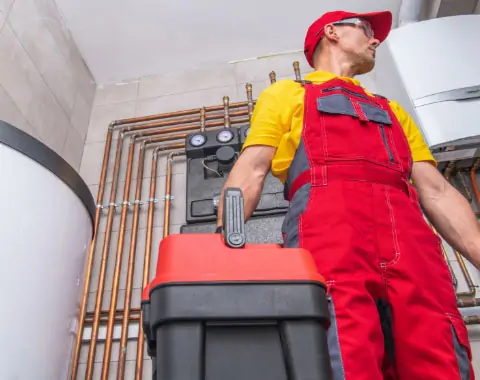
An air conditioning unit making loud noise can indicate a variety of issues, from leaks to broken parts. Because these units are expensive to repair and contain toxic chemicals, any issues should be dealt with by a trained professional.
This article explores the most common noises that come from outside units and the likely cause of these noises. Contact a Comfort Air technician to deal with the issue properly and return things to normal anytime your outside AC unit makes a loud noise.
Pay careful attention to the type of noise your outside AC unit is making, as the type of noise can give you valuable information about the likely culprit.
The most common noises and problems include:
An outdoor HVAC unit problem requires an experienced technician to deal with the issue quickly and efficiently. A Comfort Air HVAC professional is your best bet at fixing your AC system quickly and preventing future problems.
If you hear a hissing noise coming from your outdoor AC unit, your refrigerant line may have a leak.
Refrigerant is the chemical that cools your home's air. Because it runs through a closed loop of copper lines, the only time you will run out of refrigerant is if there is a leak. The change in pressure causes a hissing noise that can help you identify the problem.
Other signs you have a refrigerant leak include:
Because this is a toxic chemical, a leak requires professional attention. This serious problem should be dealt with quickly, sealing the leak and topping off your AC system so you can get back to cool air.
A rattling noise can come from something as simple as yard debris (leaves, sticks, and rocks) stuck in the outside unit. It can also be a more serious issue, like loose screws or damaged parts knocking around in the outdoor unit.
An HVAC technician will clear the outdoor unit of any debris and inspect it to determine the source of any loud noises. They will make the necessary repairs to broken or loose parts.
Screeching can mean many things. If your outdoor AC unit is making screeching noises, this indicates that the compressor might go out. The compressor is essential to air conditioning because it pumps refrigerant through the AC system.
Most compressors last 10 years, so if your AC unit is older than that you probably need to replace it anyway.
Sounds that come from inside the home point the finger at a failing blower motor. This pushes the cold air through the HVAC system, and it can wear out faster due to heavy usage (not uncommon with Tampa weather).
If you have an AC unit making a loud buzzing noise, there is probably an electrical problem such as:
A circuit breaker will make a buzzing noise as it ages or if the wiring is non-code compliant. It would also be hot to the touch, and you might notice a burning smell.
Broken capacitors commonly cause AC buzzing. Failing to start up accompanied by buzzing is often due to damage to this part.
An AC unit squealing or squeaking indicates a loose fan belt. You should only notice this with older air conditioner units; a newer AC is likely to have direct-drive motors.
The noise comes from the fan belt falling off the tracks. Worn fan motor bearings also lead to the air conditioner making a loud noise, but an HVAC technician can check the system and repair the issue quickly.

An air conditioner making a whistling noise is a sign of air duct issues. This happens when the ducts are too small to accommodate air or there is a leak. Anytime damage to the air conditioner duct impacts the flow of air, causing a loud AC.
Whistling comes from the unusual vibration of air through the AC. This issue typically requires patchwork repairs, but a more serious issue will need a full replacement.
A banging noise might be the condenser unit slamming up against the outside unit. If you have a condenser unit making a racket, dealing with it sooner will prevent loose parts from causing more damage.
Any part might bang around the air conditioner, making loud noise and hopefully alerting you before the AC ends up in worse condition.
An AC making crackling noises, similar to making popcorn, is probably sucking up the liquid form of refrigerant.
This noise requires immediate repair, and you should turn off the AC as soon as you hear the sound.
After refrigerant absorbs heat, it turns into gas that should enter the compressor in the outdoor unit. A popping AC unit noise occurs when the compressor sucks up liquid instead.
You should turn off an AC that makes popping or crackling sounds immediately to avoid damaging the compressor (an expensive part to replace).
If your AC unit fails to turn on and makes a clicking sound, you likely have an issue with the electrical components. An electrical issue is often difficult to diagnose, especially when you only have the clicking noise to guide you.
A technician will have the equipment to determine the source of the sound and perform the repairs necessary to ensure your air conditioner turns on when needed.

When looking for the best air conditioning company, choose a Rheem Pro Partner. A Rheem pro will give you the best AC repairs in Tampa.
Rheem Pro Partners use methods proven to solve your AC problems, including diagnosing and dealing with AC unit noise like:
A Rheem Pro installer must undergo regular evaluations and maintain at least a 4-star rating to keep their status. You can rest assured that they will discover why your AC is making a loud noise quickly, leading to quality repairs and returning cool air to your unit.
Installers have access to special offers on air conditioning parts and pass the savings onto consumers. You can unlock valuable promotions on parts such as a new:
Rheem products are durable and long-lasting, and they also come with comprehensive warranties. If the banging sound returns or your AC turns off because of a faulty piece, you won't have to worry about paying for the part again.
It is easy to stress when you notice issues with your outdoor unit, but bringing in a professional will give you the peace of mind you deserve.
References
https://advanced-air.com/help-guides/troubleshooting/6-loud-air-conditioning-noises-and-their-causes